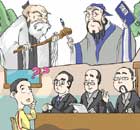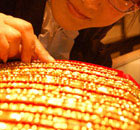Global General
Iran moves closer to nuke warhead capacity
(Agencies)
Updated: 2010-02-09 05:38
 |
Large Medium Small |
VIENNA:Iran pressed ahead Monday with plans that will increase its ability to make nuclear weapons as it formally informed the U.N. nuclear agency of its intention to enrich uranium to higher levels.
Alarmed world powers questioned the rationale behind the move and warned the country it could face more U.N. sanctions if it made good on its intentions.
Iran maintains its nuclear activities are peaceful, and an envoy insisted the move was meant only to provide fuel for Tehran's research reactor. But world powers fearing that Iran's enrichment program might be a cover for a weapons program were critical.
Britain said the Islamic Republic's reason for further enrichment made no sense because it is not technically advanced enough to turn the resulting material into the fuel rods needed for the reactor.
France and the U.S. said the latest Iranian move left no choice but to push harder for a fourth set of U.N. Security Council sanctions to punish Iran's nuclear defiance.
Even a senior parliamentarian from Russia, which traditionally opposes Western ambitions for new U.N. sanctions, suggested the time had now come for such additional punishment
Konstantin Kosachev, head of the international affairs committee of the State Duma _ the lower house of parliament _ told the Interfax news agency that the international community should "react to this step with serious measures, including making the regime of economic sanctions more severe."
Iranian President Mahmoud Ahmadinejad had already announced Sunday that his country would significantly enrich at least some of the country's stockpile of uranium to 20 percent. Still, Monday's formal notification was significant, particularly because of Iran's waffling in recent months on the issue.
Western powers blame Iran for rejecting an internationally endorsed plan to take Iranian low enriched uranium, further enriching it and return it in the form of fuel rods for the reactor _ and in broader terms for turning down other overtures meant to diminish concerns about its nuclear agenda.
Telling The Associated Press that his country now had formally told the International Atomic Energy Agency of its intentions, Iranian envoy Ali Asghar Soltanieh said that IAEA inspectors now overseeing enrichment to low levels would be able to stay on site to monitor the process.
He suggested world powers had pushed Iran into the decision, asserting that it was their fault that the plan that foresaw Russian and French involvement in supplying fuel from enriched uranium for the Tehran research reactor had failed.
"Until now, we have not received any response to our positive logical and technical proposal," he said. "We cannot leave hospitals and patients desperately waiting for radio isotopes" being produced at the Tehran reactor and used in cancer treatment, he added.
The IAEA confirmed receiving formal notification in a restricted note to the agency's 35-nation board made available to The Associated Press.
Iran's atomic energy organization informed the agency that "production of less than 20 percent enriched uranium is being foreseen," said the note.
"Less than 20 percent" means enrichment to a tiny fraction below that level _ in effect 20 percent but formally just below threshold for high enriched uranium.
At the same time, the note indicated that Iran was keeping the agency in the dark about specifics, saying the IAEA "is in the process of seeking clarifications from Iran regarding the starting date of the process for the production of such material and other technical details."
On Sunday, Iranian officials said higher enrichment would start on Tuesday.
At a news conference with French Defense Minister Herve Morin, U.S. Defense Secretary Robert Gates praised President Barack Obama's attempts to engage the Islamic Republic diplomatically and chided Tehran for not reciprocating.
"No U.S. president has reached out more sincerely, and frankly taken more political risk, in an effort to try to create an opening for engagement for Iran," he said. "All these initiatives have been rejected."
Morin said France and the U.S. agreed that there was no choice but "to work for new measures within the framework of the Security Council" _ a stance echoed by Israel, Iran's most implacable foe.
Tehran's enrichment plans are "additional proof of the fact that Iran is ridiculing the entire world," said Israeli Defense Minister Ehud Barak. "The right response is to impose decisive and permanent sanctions on Iran."
Although material for the fissile core of a nuclear warhead must be enriched to a level of 90 percent or more, just getting its stockpile to the 20 percent mark would be a major step for Iran's nuclear program. While enriching to 20 percent would take about one year, using up to 2,000 centrifuges at Tehran's underground Natanz facility, any next step _ moving from 20 to 90 percent _ would take only half a year and between 500-1,000 centrifuges.
Achieving the 20-percent level "would be going most of the rest of the way to weapon-grade uranium," said David Albright, whose Washington-based Institute for Science and International Security tracks suspected proliferators.
Soltanieh declined to say how much of Iran's stockpile _ now estimated at 1.8 tons _ would be enriched. Nor did he say when the process would begin. Albright said enriching to higher levels could begin within a day _ or only in several months, depending on how far technical preparations had progressed.
Apparent technical problems could also slow the process, he said.
Iran's enrichment program "should be like a Christmas tree in full light," he said. "In fact, the lights are flickering."
While Iran would be able to enrich up to 20 percent, a senior U.S official told the AP that the research reactor would run out of fuel before enough materialn move came just days after Ahmadinejad appeared to move close to endorsing the original deal, which foresaw Tehran exporting the bulk of its low-enriched uranium to Russia for further enrichment and then conversion for fuel rods for the research reactor.
That plan was welcomed internationally because it would have delayed Iran's ability to make a nuclear weapons by shipping out about 70 percent of its low-enriched uranium stockpile, thereby leaving it with not enough to make a bomb. Tehran denies nuclear weapons ambitions, insisting it needs to enrich to create fuel for an envisioned nuclear reactor network.
The proposal was endorsed by the U.S., Russia, China, Britain, France and Germany _ the six powers that originally elicited a tentative approval from Iran in landmark talks last fall. Since then, however, mixed messages from Tehran have infuriated the U.S. and its European allies, who claim Iran is only stalling for time as it attempts to build a nuclear weapon.
Iran has defied five U.N. Security Council resolutions _ and three sets of U.N. sanctions _ aimed at pressuring it to freeze enrichment, and has instead steadily expanded its program.






